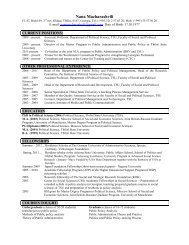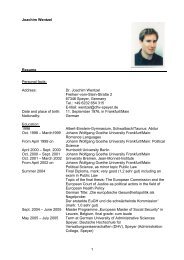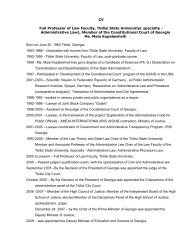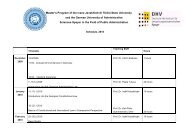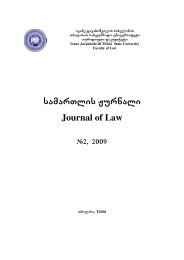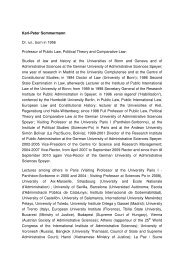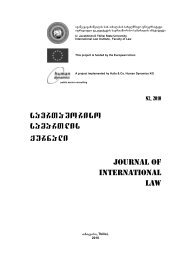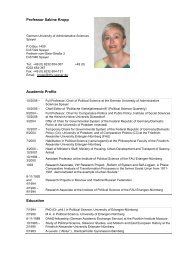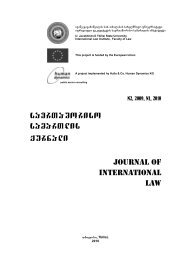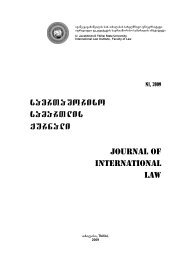Untitled
Untitled
Untitled
You also want an ePaper? Increase the reach of your titles
YUMPU automatically turns print PDFs into web optimized ePapers that Google loves.
N. KALANDADZE, INTERNATIONAL CONVENTION ON THE PROTECTION OF THE RIGHTS OF ALL ...<br />
Furthermore, monitoring committees elaborate<br />
directives for the States to write reports,<br />
clarify general definitions of the provisions of<br />
the Convention, and arrange discussions related<br />
to the Convention. One of the functions<br />
of the committee also includes the promotion<br />
of enhancement of implementation of provisions<br />
of the Convention by the State Parties<br />
to the Convention on migrant workers.<br />
In accordance with the provisions of Article<br />
76 of the Convention on Migrant workers,<br />
any State Party to this Convention is entitled<br />
to address another State in written form if considers<br />
that this State violates or does not perform<br />
the obligations under the Convention.<br />
After three months from the date of receipt of<br />
the written notification, the State shall submit<br />
explanation or any other statement in written<br />
form to the sending State.<br />
Similar written notification regarding the other<br />
State shall be submitted to the relevant committee<br />
by any State. Within 12 months from<br />
the date of receipt of such notification the committee<br />
shall submit a report. If the decision is<br />
positive, the committee will refer only facts and<br />
solution methods in its report. But if it is not<br />
possible to solve the issue positively, the report<br />
of the committee shall include list of facts<br />
related to issue raised between the States concerned.<br />
From practical or diplomatic point of view,<br />
the States avoid and sometimes even do not<br />
want to be involved in disputes between the<br />
States. It is proved also by the experience of<br />
International Judiciary. Even in well founded<br />
court systems such as in EU and Council of<br />
Europe, the amount of interstate appeals is<br />
very low. 27<br />
Such kind of applications shall be delivered<br />
to the UN Secretary General, who shall<br />
send their copies to the other member States<br />
to the Convention on Migrant Workers. Such<br />
written notification shall be any time abolished<br />
by sending notification to the Secretary General.<br />
In case of threat to peace and security the<br />
UN Security Council may intervene, despite<br />
the facts who lodged the complaint. 28<br />
All abovementioned procedure shall come<br />
into force when ten States Parties to the Convention<br />
on Migrant Workers recognize the<br />
competence of the Committee on migrant<br />
workers to consider communications to the<br />
effect that a State Party claims that another<br />
State Party is not fulfilling its obligations (Article<br />
76, paragraph 2 of the Convention).<br />
Interstate appeals shall remain faithful and<br />
intimidating safe means of traditional nature<br />
of international law. 29<br />
2.3. Procedure of Interstate Appeals<br />
According to the Convention on<br />
Migrant Workers<br />
2.4. Procedure of Individual Appeals<br />
in Accordance with the Convention<br />
on Migrant Workers<br />
Individual appeals are one of the mechanisms<br />
implementing human rights. As the<br />
mechanism of receiving individual appeals<br />
does not operate yet, procedural rules are not<br />
elaborated by the Committee on Migrant Workers<br />
and thus it does not have an experience<br />
in the field of individual appeals. However the<br />
Committee may operate similarly to the procedures<br />
established by other bodies and implement<br />
activities, stipulated by Article 77 of<br />
the Convention on Migrant Workers, through<br />
the same methods. 30<br />
As it is already mentioned a certain element<br />
of sanction may be imposed on a State, if it violates<br />
obligations under the treaty. Therefore,<br />
individual appeals partially help the performance<br />
of obligations related to human rights – perhaps<br />
the State will have an appropriate approach to<br />
the obligations, rather than risk to introduce a<br />
punitive sanction. Negative results often push a<br />
State to change its legislation or practice. 31 It<br />
should be mentioned that the success of individual<br />
appeals is higher when local means are<br />
available to the claimant. 32<br />
3. SPECIAL RAPPORTEURS IN MONITORING<br />
SYSTEMS OF LABOUR MIGRANTS<br />
Human rights monitoring international organizations<br />
often address to Rapporteurs for<br />
assistance.<br />
The Commission requires special Rapporteurs<br />
33 to discuss obstacles related to the implementation<br />
of migrant rights, including legal<br />
and illegal migrants. 34<br />
Upon receiving the information on violation<br />
of rights of migrants, Special Rapporteur<br />
shall immediately send an appeal or address<br />
to the relevant State, in order to clarify the<br />
situation and/or to draw attention on them. 35<br />
143



